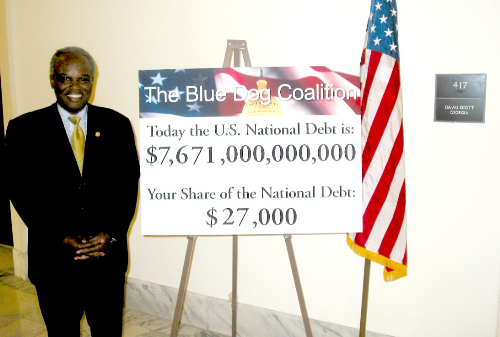Floor Speeches
Scott Statement on Record National Debt
Washington,
January 9, 2007
|
Chandra Harris
(770-210-5073)
Tags:
Taxes
Scott Statement on Record National Debt
Today Congressman David Scott (D-GA) delivered the following remarks on the Floor of the U.S. House of Representatives: Thank you very much, Mr. Ross, for yielding. And to my fellow colleagues, it is such a pleasure to join you once again. When we were here last, we were in the minority, and we said some things. We said what we wanted to do. We said some of the first things we would do when we got here, and one of those was to address this serious problem of financial and fiscal responsibility. I had some time to reflect on our history, and as we looked at the very first move that we made when we came back last week, one of our first measures was to establish pay-as-you-go, PAYGO. It is very interesting that this is not a new phenomenon. Not only did we have it in store when we had the Clinton administration and prior to that, but from the very foundation of our country, it was Thomas Jefferson. First, Thomas Jefferson was so against government debt and its inherent dangers that, back in 1789, in a letter that he wrote to James Madison and Alexander Hamilton, Framers of our Constitution, in that letter, Thomas Jefferson wondered in the letter as he wrote to Madison and Hamilton, he wondered this, whether, quote, ``one generation of men has a right to bind another.'' And he came to his answer with an exclamation point in the letter: ``No.'' He said that ``the Earth belongs in usufruct to the living.'' One generation of consumers borrowing and spending then hands that bill to the next generation, that get the benefits of spending the money in the present while passing on the debt to future generations, that is not what the Founding Fathers had in mind. And each generation as we move through our history paid down its debt before it moved on, oftentimes marked by war. In 1812, the debt was paid down. The Civil War, borrowed money, the debt was paid down. And into World War I and World War II when the debt really amassed up to $62 billion, and yet over time and those generations those debts were paid down. All of the way up through the Cold War, even into the Reagan years, and up to Clinton, up to the year 2001. But then after 2001 when this Republican administration took hold, in the 5 years that ensued, this President and the preceding Congress, controlled by Republicans, borrowed more money from foreign governments and foreign nations than the entire preceding 218 years of this country. From 1789, the year Thomas Jefferson wrote these words to caution us and set the pattern to pay as we go, here we are now with that big situation hanging over us of the borrowing from our debt. And I mention that because we are now faced with that situation where we are borrowing this money, over $1.5 trillion over the last 5 years, from countries in the most unstable regions of the world: $310 billion from Communist China; nearly $700 billion from Japan; and nearly $300 billion from the unstable OPEC countries in the Middle East which we are dealing with now. This is the background which we are having to deal with today. Mr. Speaker, it is important that we remind people that not only are we talking about the billions of dollars that we just articulated we are borrowing from these foreign governments, more than we borrowed over the last 218 years, but the interest, the money that these folks are making off of us now constitutes the fastest growing part of our budget. We are spending more just paying for the money on the interest that is being charged than we are spending on education, the environment, and veterans at a time when our veterans are making such fantastic contributions and at a time when there needs to be a greater emphasis placed on those who have been on the battlefield and are coming home, and we are spending more on the interest there. Let me just finalize this for a moment, and I just want to mention because we are here and we talked about what we wanted to do. Pay-as-you-go was one of the deals we made. We passed earlier today the 9/11 Commission recommendations. We have worked on so many other things, but I do want to just mention the earmark reform legislation that we passed, and just to share with the American people what we have already passed in our earmark reform. It will require committees to disclose the sponsors of any earmarks included in appropriations authorizing measures such as the highway bill and the tax or trade legislation that benefits 10 or fewer. We will have new rules that will prohibit trading earmarks for votes and require Members to disclose their earmark request and certify that they and their spouses have no personal financial interest in the requests. These provisions comprehensively require committees of jurisdiction and conference committees to publish lists of the earmarks, limit tax benefits, and limit tariff benefits, along with their sponsors contained in the reported bills and the managers' amendments and conference reports brought to the House floor for consideration. A Member may make a point of order against consideration of any rule that waives this requirement. The rule defines an earmark as any Member-requested project that is targeted to a specific place and falls outside of a formally driven competitive process. Transparency, clearness: this is what the American people want. And I am proud to see us in our first week of action be able to pass these important measures that bring about good strong stewardship of the taxpayer money. |



